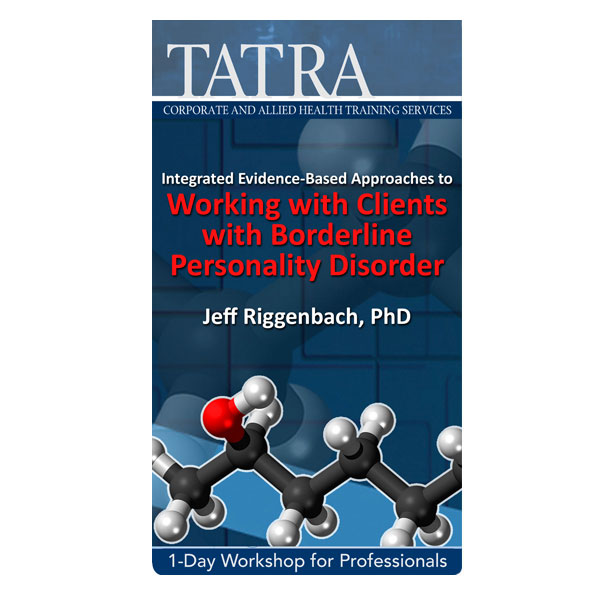Integrated Evidence-Based Approaches to Working with Clients with Borderline Personality Disorder

Jeff Riggenbach, PhD
Leave this enjoyable and information packed seminar with a new ability to help struggling individuals deal with issues related to self-harm, multiple suicide attempts, frequently hurt feelings, intense and unpredictable mood swings, shame, trauma, toxic relationships and other problems that impair their ability to function in society.
Course Dates
Sydney: 9 May 2019, SMC Conference and Function Centre
Brisbane: 13 May 2019, Mantra on Queen
Melbourne: 17 May 2019, Bayview on the Park
Adelaide: 22 May 2019, Next Gen Memorial Drive
Perth: 27 May 2019, Wollaston Conference Centre
9:15am to 4:30pm
Attend this workshop and join a leading expert in the field of BPD, Dr Jeff Riggenbach as he presents a multimodal approach to managing and treating this client population. Leave this enjoyable and information packed seminar with a new ability to help struggling individuals deal with issues related to self-harm, multiple suicide attempts, frequently hurt feelings, intense and unpredictable mood swings, shame, trauma, toxic relationships and other problems that impair their ability to function in society. You will leave this workshop equipped with techniques to assist these clients you no longer need to experience as difficult, frustrating, and exhausting.
Borderline personality disorder is widely considered the most difficult to treat diagnosis faced by the mental health community. Co-occurring BPD characteristics are associated with treatment failure for a broad range of other conditions. Until recent years, many practitioners have considered the BPD diagnosis “untreatable” but the emerging research suggests this is simply not the case. Dialectical Behaviour Therapy (DBT) has paved the way in pioneering new attitudes and outcomes when working with this condition. Although components of DBT skills training are helpful for most, some individuals continue to respond poorly to treatment. Many clients who suffer from BPD lack motivation, have poor insight, and some have deeply engrained dysfunctional beliefs, unhealthy coping skills, and destructive behavioural patterns that continue to frustrate providers, family members, and consumers alike.
There is hope. Other evidence based approaches offer simple but powerful techniques to compliment DBT that help promote change at a deeper level in your most challenging clients. Improving outcomes have prompted the DSM to recently note “prognosis for many patients with BPD is actually quite good.”
- APS: Activities do not need to be endorsed by APS. Members can accrue 7 CPD hours by participating in this activity
- AASW: Members can accrue 7 CPD hours by participating in this activity
- ACA: Members can accrue 5 CPD points by participating in this activity
A certificate of attendance will be emailed to participants following the workshop.


